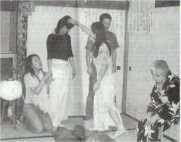THE JAPAN TIMES・THURSDAY,SEPTEMBER 11,2003
|
|
Seniors enjoy thespian therapy
Playback theatre group acts out scenes from their lives
|
By NAO SHIMOYACHI staff writer
Kiyoko Goto, 86,dried her eyes several times as she watched the action unfold before her.
"It's good to see, it's good to see," she said.
 At a glance, the play did not appear to be anything more than a straightforward tale focusing on a family gathering during the summer Bon holiday. At a glance, the play did not appear to be anything more than a straightforward tale focusing on a family gathering during the summer Bon holiday.
Yet it was special for Goto because it was a scene from her own life, memories of which had been stirred by a group of actors who visited Hot House Nukunuku, a nursing home for the elderly in Shinagawa Ward, Tokyo.
Goto was one of 13 nursing home residents who gathered in the living room for a workshop presented by seven members of Rashinban, one of seven groups in Japan dedicated to performing Playback Theatre. This is a form of theatrical improvisation in which actors try to depict real events outlined by audience member.
The style was invented in 1975 by American writer Jonathan Fox, who was seeking a more down-to-earth, community-based form of drama than mainstream theater.
Today it is performed by about 75 groups in 30 countries around the world in a variety of setting. It can take the form of pure entertainment but can also be used for therapeutic and counseling purposes. It was introduced to Japan in 1987.
An international conference on Playback Theatre, featuring workshops on techniques and usage, is scheduled to be held in Shizuoka Prefecture from Sept.25 to Sep.28.
The conference will be the eighth of kind, with these gatherings held on a biennial basis.
At Hot House Nukunuku, Rashinban utilizes Playback Theatre as a mean of awakening the memories of the residents, many of whom suffer from some kind of dementia.
"How did you spend your Bon holidays when you were small?" Rashinban member Keiko Matsumoto asked Goto.
Matsumoto is a group therapist and has her own office in Tokyo. The other six actors, ranging from an occupational therapist to drama student, also mingled with the seniors and encouraged them to talk.
For the most part, Goto just nodded in response to Matsumoto's questions.
The actor did manage, however, to elicit the fact that she had been brought up a very strict family in Aichi Prefecture. She also learned that Goto's family treated her grandfather warmly when they got together for the Bon holiday.
Matsumoto then let Goto choose which actors should play herself, her parents and grandfather. She also repeated goto's story so that everyone else in the room could hear.

At Matsumoto's command, the seven Rashinban actors then played out Goto's tale, using movement, dialogue and music. Without any consultation among the performers, the play gravitated perfectly toward a happy final scene-a family photo shot with the grandfather at the center.
Though Playback theatre memories probably do not last very long in the minds of these elderly spectators, there are hidden benefits.
"They can't remember things and they will probably forget what they saw here quite soon, " said Yoko Tsuchibuchi, who manages the nursing home." But being reminded of happy memories certainly helps stop their dementia from developing, if not reverse the condition. "
And for the staff at Hot House Nukunuku, the once-a-month workshop is an occasion for discovery.
"Did you know that Hyakutaro-san went fishing?" caregiver Miwa Saito told a colleague after watching a play that focused on Hyakutaro Tanaka, now 94, going sea fishing with his father as a child.
"We have personal history card (for each of residents), but it does not reveal all their past," she said.
Tomokazu Haneji, leader of the Rashinban group and one of the people who introduced Playback Theatre to Japan, places a special emphasis on the community spirit fostered through Playback Theatre performances.
"Up until around the Middle Ages, drama used to be a occasion where people in the community shared various values. " Haneji said." Playback Theatre is a form of drama that preserves this original form." Use of Playback Theatre has diversified. Aside from Hot House Nukunuku, Rashinban members regularly visit clinics and hospitals for mentally ill people and alcoholics. They also conduct workshops at some major companies as part of human resources development programs. Outside Japan, Playback Theatre has also been used to ease tension and ill feeling in multicultural environments, such as in refugee camps in Angora and New York following the Sept.11, 2001, terrorist attacks.
"Playback Theatre offers an opportunity for people to share their experiences," said Haneji. "Maybe it's the reassurance you get from your story, however troubled, having been heard and accepted that leads to therapeutic effect."

Kenji Moroe, a psychiatrist at a Fukuoka Prefecture clinic, has held Playback Theatre sessions once every three months since 2001.
He said that Playback Theatre helps some patients find the source of their pain and face their problem objectively.
He added that, where other treatments have failed, Playback Theatre sessions have even helped some of his patients to venture back out into society.
"Most people with a personality disorder have difficulty fitting in a group," Moroe said." They may get some kind of reassurance though a face-to-face meeting (with a doctor)…but being accepted by everyone (present at Playback session) means much more than just building trust with one doctor. "
"Everyone has the desire to tell," Haneji said in summing up why Playback Theatre become so popular." It appears to me, however, that we have fewer and fewer occasions when we can tell our stories in a fully relaxed way."
back
|
|